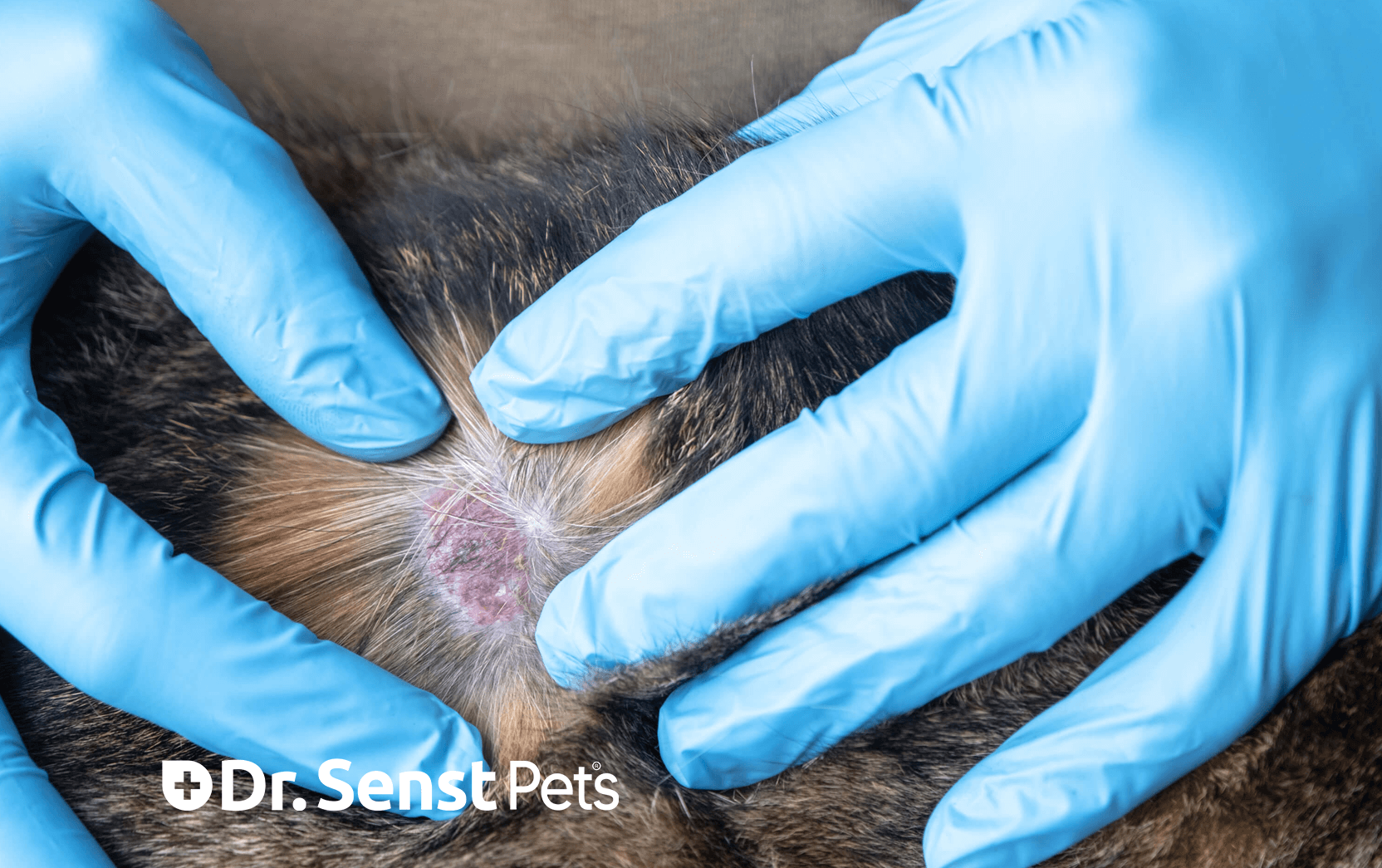
- by Dr.Thilo Senst
What Causes Itchy Skin in Cats? Common Triggers and Solutions
- by Dr.Thilo Senst
What Causes Itchy Skin in Cats? Common Triggers and Solutions
Just like humans, cats can experience skin issues that lead to discomfort and itching. "Cat itchy skin" is a common complaint among pet owners and can arise from a variety of causes, from allergies to parasites. Understanding these causes and learning how to address them can make a world of difference for your cat’s comfort and overall well-being.
This guide explores the common triggers of itchy skin in cats, helping you identify symptoms and offering tips for soothing your cat’s skin. By pinpointing the root cause, you’ll be better equipped to manage or eliminate the issue altogether.
Cat itchy skin, often referred to as feline pruritus, is a sensation that prompts your cat to scratch, lick, or bite at its skin. This can result in hair loss, redness, scabs, and, in severe cases, skin infections. An itch-scratch cycle can lead to worsening symptoms, causing significant discomfort and potentially serious health issues for your cat.
A study from the PDSA (People’s Dispensary for Sick Animals) in the UK shows that skin issues are among the top five reasons for veterinary visits for cats, underscoring the importance of understanding and addressing skin-related problems in our feline companions.
Allergies are one of the most common reasons for cat itchy skin. Cats can be allergic to various substances, including certain foods, environmental elements (such as pollen or dust mites), and even chemicals in cleaning products.
Fleas, mites, and ticks are notorious culprits when it comes to cat itchy skin. Even a single flea bite can cause intense itching in cats, especially if they’re allergic to flea saliva, a condition known as flea allergy dermatitis.
Dr. Senst Antiseptic Flea Treatment for Cats offers targeted relief and helps prevent recurring infestations.
Bacterial and fungal infections can also lead to itchy skin in cats. Bacterial infections often occur as secondary issues, developing after the skin has been compromised by scratching or another underlying problem. Fungal infections, such as ringworm, are highly contagious and commonly lead to hair loss, scaly skin, and intense itching.
Cats with dry skin are prone to itchiness, especially in colder months when indoor heating can strip moisture from the air. Cats on low-fat diets may also lack the essential fatty acids necessary for healthy skin, resulting in dryness and flakiness.
Determining the exact cause of your cat’s itchy skin often requires a visit to the vet. A veterinarian may conduct various tests, including:
These diagnostic tests can help pinpoint the underlying issue and guide treatment options.
Brushing your cat regularly can help remove loose fur, prevent matting, and distribute natural oils that keep the skin healthy. It’s a simple way to minimise itchy skin, especially for cats with long fur.
Bathing your cat with a hypoallergenic, gentle cat shampoo can alleviate itchiness caused by allergens and environmental irritants. Avoid harsh chemicals and opt for natural ingredients to prevent further irritation.
Omega-3 fatty acids are essential for maintaining healthy skin. Consider adding these to your cat’s diet through supplements, as they help reduce inflammation and keep the skin moisturised.
If your cat suffers from environmental allergies, keeping your home clean can make a significant difference. Regular vacuuming, using air purifiers, and washing your cat’s bedding can help reduce allergen exposure.
Imagine having an itch on your skin that only worsens the more you scratch. This cycle, known as the itch-scratch cycle, is similar to what cats experience. Every scratch further irritates the skin, which can lead to a vicious cycle of discomfort. Breaking this cycle is crucial in managing itchy skin and requires a combination of calming treatments and avoidance of irritants.
Q1: Can my cat’s food cause itchy skin?
Yes, food allergies are a common cause of itchy skin in cats. If you suspect a food allergy, speak with your vet about trying a hypoallergenic diet.
Q2: How often should I bathe my cat to prevent itchy skin?
Generally, cats do not require frequent baths. However, for cats with allergies or skin conditions, occasional baths with a mild cat shampoo can be beneficial. Consult your vet for guidance.
Q3: Are there natural remedies for cat itchy skin?
Yes, omega-3 fatty acids, hypoallergenic diets, and products like Dr. Senst Antiseptic Itchy Cats Spray can help manage and relieve itching naturally.
Designed specifically for itchy cats, Dr. Senst Antiseptic Itchy Cats Spray helps alleviate discomfort caused by skin irritation, allergies, or minor wounds. This spray promotes healing, soothes the skin, and helps break the itch-scratch cycle.
For cases where fleas are the primary cause of itching, Dr. Senst’s flea treatment provides effective relief and helps prevent further infestations, protecting your cat from flea allergy dermatitis.
Anxiety and stress can exacerbate itching in cats. Calming products, like Dr. Senst Cat Calming Hemp Oil, provide a natural way to soothe your cat’s nervous system, reducing excessive grooming and scratching behaviour.
Managing cat itchy skin starts with identifying the root cause and addressing it with appropriate treatments. From allergies to dry skin, each trigger requires a tailored approach to minimise discomfort and prevent recurrence. Dr. Senst offers a range of products designed to treat and soothe cat skin issues, including Antiseptic Itchy Cats Spray for immediate relief, Antiseptic Flea Treatment for Cats for flea control, and Cat Calming Hemp Oil to alleviate stress-related itching.
By combining these products with regular grooming and a healthy diet, you can help your cat feel comfortable in their skin, promoting overall wellness and happiness.
![]()
Enter your details & download our comprehensive 50+ page printable Dr. Senst Pet Care Planner completley FREE! - keep track of all your pet’s needs, from medical history and training to vet visits, grooming, diet, and more!










Share:
How to Handle a Cat’s Fear of Strangers: Calming Techniques for Cats
The Best Ear Cleaning Solutions for Dogs: Vet-Recommended Choices